The best laptops for game development
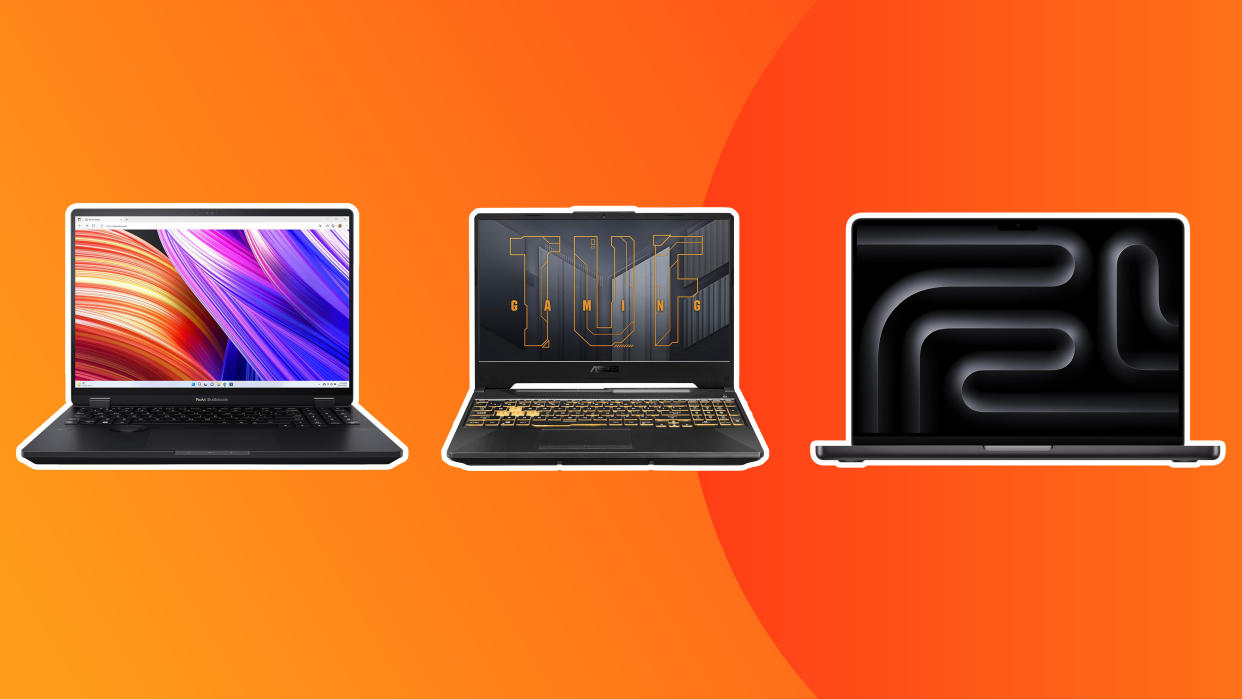
Quick Menu

The list in brief ↴
1. Best overall: Asus H7604
2. Best budget: Acer TUF F15
3. Best Apple: MacBook Pro 14 (M3 Pro)
4. Best Chromebook: Acer Spin 514
5. Best large: Asus Vivobook Pro 16
6. Best workstation: Precision 5470
7. Best 2-in-1: Asus Zenbook Duo 2024
8. Also tested: Asus Zenbook 14 OLED
How to choose
FAQs
How we test
Choosing one of the best laptops for game development is a important decision for both professional game developers and aspiring creators. There’s a lot to consider: what kind of games are you going to be working on? Triple-A games with innovative mechanics, cutting-edge 3D graphics and cinematics will need a much more powerful machine with a dedicated graphics card than less graphically intensive indie titles.
This means that a wide range of laptops can serve for game development depending on your area of focus. And we know many game developers who prefer portability and good battery life over the power to actually run AAA games. With this in mind, we've carefully chosen the laptops on this list based on our own expert testing and reviews and an evaluation of each laptop's specs, power and price. In our tests, we look at benchmark tests and combine them with our own real-life experiences to pick out the best laptop for each use case.
If you’re as passionate about playing games as you are about making them, you may also find our guide to the best laptops for gaming useful. For more laptop options, our best laptops for programming, as well as the best laptops for animation guides may be helpful.
The quick list
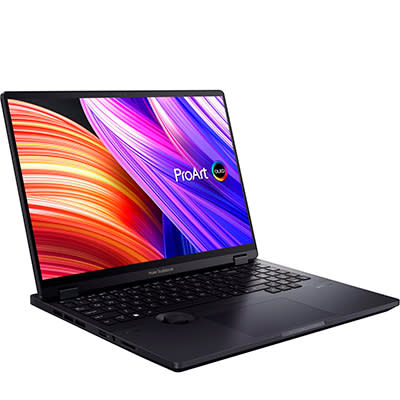
1. ASUS ProArt Studiobook OLED (H7604)
This laptop packs some of the most powerful components on the market along with a bright 3.2K 3D and creative-friendly ergonomics, such as the dedicated ASUS Dial. A perfect combination of power and form.
Read more below
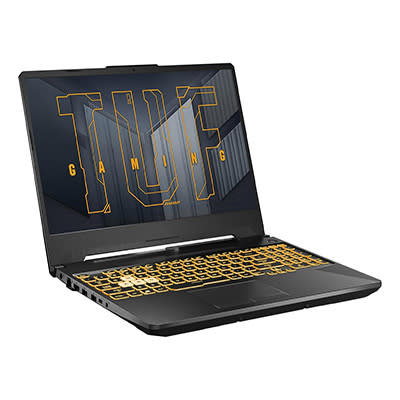
Best budget
2. Acer TUF Gaming F15
This great value gaming laptop offers impressive performance for its price. It's not got the power of some of the other laptops on this list but it does have 12 Gen Intel processors and a 1400p screen.
Read more below
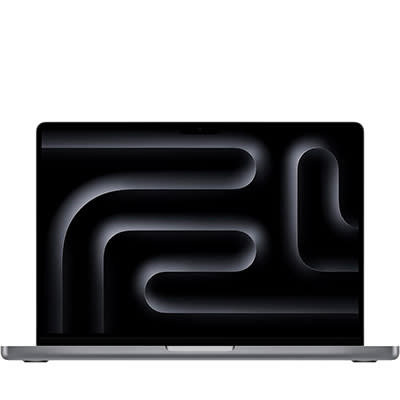
3. Apple MacBook Pro 14 (M3 Pro)
With the new M3 processors now supporting ray tracing and mesh shaders, MacBooks are starting to make more sense for game development beyond just iOS games, which they can run natively. And the design, display and battery are just excellent.
Read more below

4. Acer Chromebook Spin 514
A Chromebook isn't going to allow you to play advanced games, but there's no reason why you can't code on one, and the Spin 514 is a sturdy, surprisingly capable and versatile laptop for the price.
Read more below
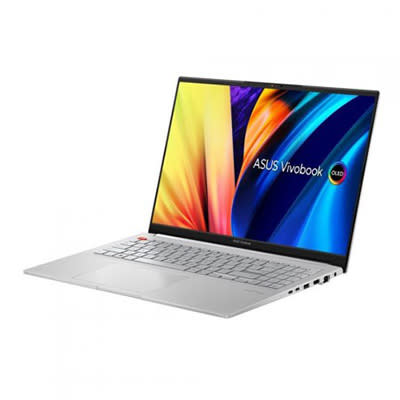
5. Asus Zenbook Pro 16 OLED
The Asus Zenbook Pro 16 OLED is a great mid-range laptop that sits between the budget and more pro options. Its screen is absolutely gorgeous, with a 16:10 aspect ratio that our reviewer particularly loved.
Read more below
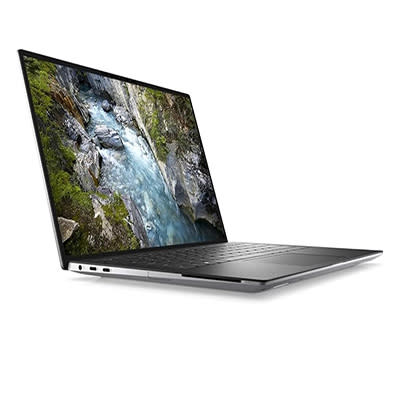
6. Dell Precision 5470
It may not look especially flashy, but the Dell Precision 5470 has enough going on to handle the heaviest game development, rendering or 3D processing tasks. Battery life is great too.
Read more below
The best laptops for game development in full
The best laptop for game development overall
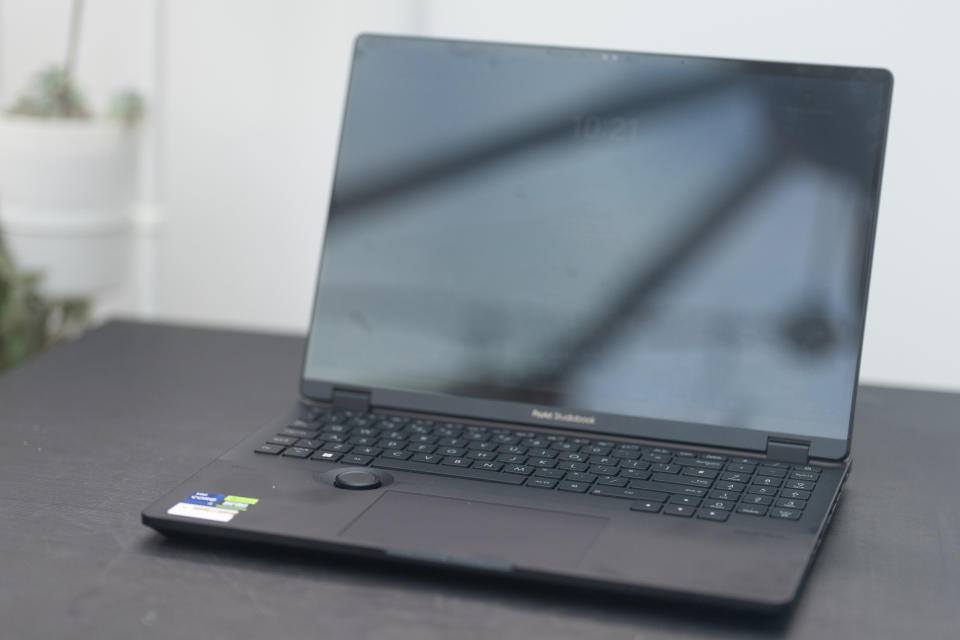

01. ASUS ProArt Studiobook OLED (H7604)
This 3D powerhouse is our top pick as the best laptop for game development
CPU: Intel Core i9-13980HX | Graphics: NVIDIA GeForce RTX 4070 | RAM: 64GB | Screen: 16in, glasses-free 3D OLED, 3200x2000 | Storage: 8TB (2x4TB SSD)
Useful dial
3D screen
Thunderbolt 4
Keyboard layout a bit odd
Battery life a little low
Fan a little noisy
A laptop that offers some of the most powerful components on the market, the Asus ProArt Studiobook is ideal for game development. We love the sharp, bright 3.2K 3D screen as well as the creative-friendly ergonomics, such as the dedicated ASUS Dial next to the trackpad.
The graphics card, storage and RAM configurations all make this one of the best creative laptop candidates that can handle gaming testing as well as development. Our Asus ProArt Studiobook review found that the Studiobook is up there with the best processors currently on the market and can easily handle heavy workloads in creative apps. It doesn't come cheap, but we think its specs are more than worth it.
The best budget laptop for game development
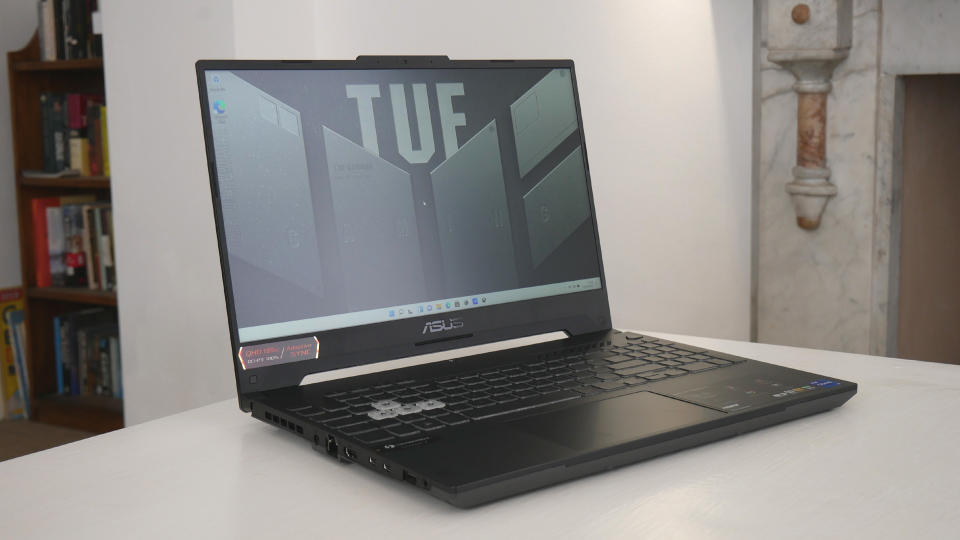
02. Asus TUF Gaming F15
A more affordable gaming laptop for game development
CPU: Up to 12th Gen Intel Core i7-12700H Processor 2.3 GHz | Graphics: Up to NVIDIA GeForce RTX 3070 Laptop GPU | RAM: Up to 16GB | Screen: Up to 15.6-in WQHD (2560 x 1440) 16:9, anti-glare display, DCI-P3:100, 165Hz | Storage: Up to 1TB
Good value for gaming specs
Decent battery life for a gaming laptop
Good colour accuracy
Not the best screen quality
Sound quality not amazing
If you're looking for the best gaming laptop for game development that doesn't cost the Earth, we'd recommend considering the Asus TUG Gaming F15. When we reviewed it, we found this great value gaming laptop to offer impressive performance for its price, making it an option if you need to test more demanding games.
It's been updated with 12th Gen Intel processors, and the 1440p screen boasts a 165Hz refresh rate and 100 per cent coverage of the DCI-P3 gamut. It's by no means the most powerful gaming laptop out there, but these specs (and the battery life) are fantastic for the price. Read our full Asus TUF Gaming F15 review for more details.
The best MacBook for game development
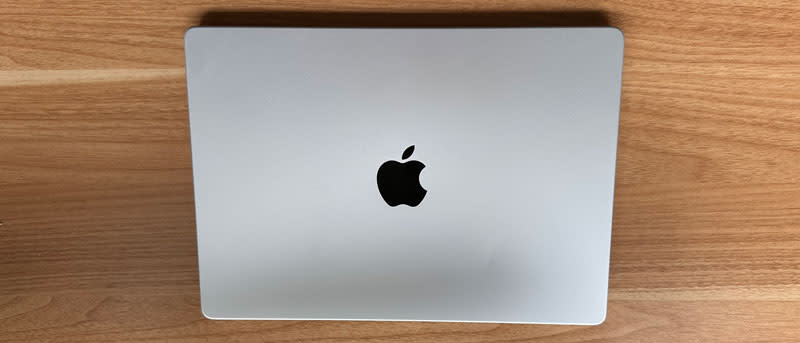

03. MacBook Pro 14-inch (M3 Pro, 2023)
A lot of power in a sleek compact machine
CPU: Apple M3 Pro 11-core to M3 Max 16-core | Graphics: Up to 40-core integrated GPU | RAM: Up to 128GB | Screen: 14-inch Liquid Retina XDR display | Storage: Up to 8TB
Outstanding performance and screen
Highly portable
Good connectivity
Cheaper options available
While Apple Mac computers aren't known for gaming, Apple's iPhone and iPad systems have huge libraries of mobile games, and making a hit iOS (the operating system iPhones use) game can earn you a lot of money. If you want to design iOS games, the MacBook Pro 14-inch is a brilliant option. It's incredibly powerful, allowing you to compile code in seconds, and it can run emulations of various iPhone models to allow you to see how your game plays on Apple's smartphones. It's powered by the capable new M3 Pro chip from Apple. It can run iOS games natively, so you can play your game (and check out the competition) without needing an iPhone.
We also reckon it still has just about the best display you can currently get on a laptop (along with its larger sibling). This is thanks to the stunning miniLED technology that offers astounding image quality. We've placed the 14-incher here because we like its portability, but if you prefer a larger laptop for game development, then see our 16-inch MacBook Pro (M3) review.
The best Chromebook for game development
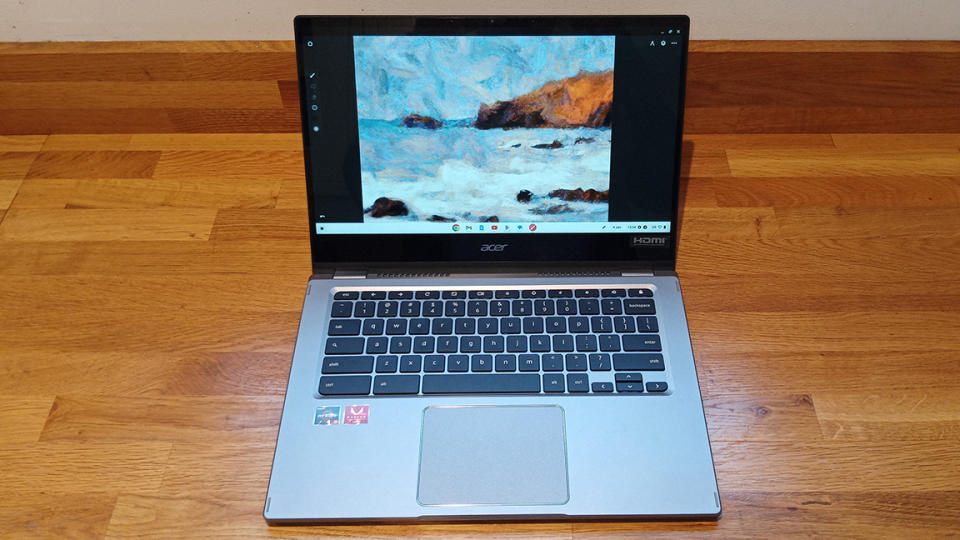
04. Acer Chromebook Spin 514
This affordable but dependable laptop is an option for coding
CPU: AMD Ryzen 5 3500U | Graphics: AMD Radeon Graphics shared memory | RAM: 8GB | Screen: 35.6 cm (14") Full HD (1920 x 1080) 16:9 Touchscreen | Storage: 128GB Flash memory
Fast and reliable performance
14-inch FHD touchscreen
2-in-1 design
Keyboard can feel laggy
At the opposite end of the laptop spectrum, you might not normally think of a Chromebook as being a good laptop for game development. And no, they don't have the power to handle very advanced gaming themselves, but you can code on them. If you're looking for an affordable option and don't need to test high-performance games, then a Chromebook can make sense. They offer long battery life and might even save you from getting distracted while working since they can do fewer other things.
The Acer Chromebook Spin 514 is a well-built, fairly capable machine that runs Chrome OS, and it's also a lot more affordable than a Windows laptop or a MacBook. It's rare to get a 14-inch touchscreen of this quality for under $500 / 500, and while the Ryzen 5 build is the top end of that price point it represents excellent quality if you're after a solid 2-in-1. As ever with ChromeOS its apps are limited to the Google Play Store, so do some research and ensure you're happy with the spread of options. Read our full Acer Chromebook Spin 514 review for the full lowdown.
The best laptop for game development with a larger screen
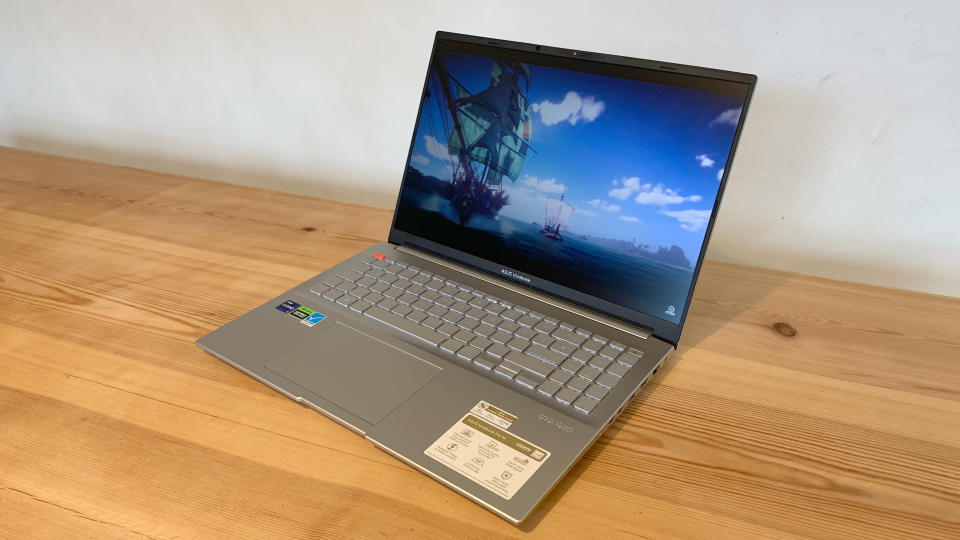
05. Asus Vivobook Pro 16 OLED
A portable laptop a large touchscreen
CPU: Up to Intel Core i9-139OOH | Graphics: NVIDIA GeForce RTX 4060 | RAM: Up to 32GB | Screen: 16-inch 3.2K 120Hz OLED | Storage: 512GB-2TB SSD
Stunning OLED display
Lots of port options
Well built
Pedestrian battery life
Trackpad tricky to use
We loved the Asus Vivobook Pro 16 when we tested it, and found it to be a great mid-range laptop that sits between the budget and more pro options. In our tests, it scored around the same as the MacBook Pro 16-inch M1, although we did find it be a little lacking when real-time rendering.
Its screen is fantastic, though, which we found to be a treat for the eyes. The resolution is 3,200 x 2,000 pixels and our reviewer really loved the 16:10 aspect ratio, which gives just a little bit of extra vertical display. Colour accuracy is good, too and the 600 nits of brightness worked well both indoors and outside.
Overall this laptop will work well if you want something not too expensive but with lots of useful features, but it may not be able to handle more intensive game development work. See our Asus Vivobook Pro 16 review for more details.
The best workstation for game design
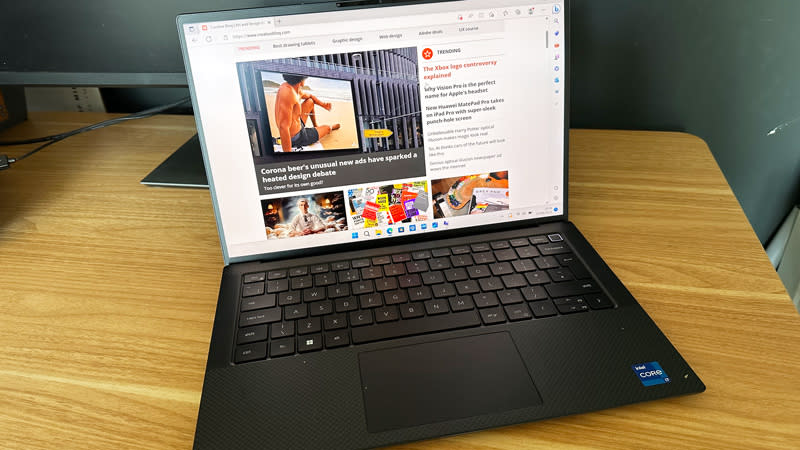
06. Dell Precision 5470
A powerful mobile workstation for game development
CPU: 12th-generation Intel Core i7-12700H/12800H | Graphics: NVIDIA RTX A1000 | RAM: 16-32GB | Screen: 14in 2560x1600 | Storage: Up to 4TB
Extremely powerful
Robust, sleek and highly portable design
Exceptional battery life
Limited ports
It doesn't look like the flashiest laptop around, but the Dell Precision 5470 is a compact little wolf in sheep's clothing, as our reviewer remarked. The unremarkable exterior hides a powerful workstation with a gorgeous, pinsharp screen and enough grunt under the bonnet to handle the heaviest game-dev, rendering or 3D processing tasks you'll see this side of a studio project. While many powerful laptops sacrifice battery life in search of ultimate performance, the Dell Precision 5470 is refreshing in that it offers enough battery life to last you most of the day before having to hunt down an outlet.
The best 2-in-1 for game development
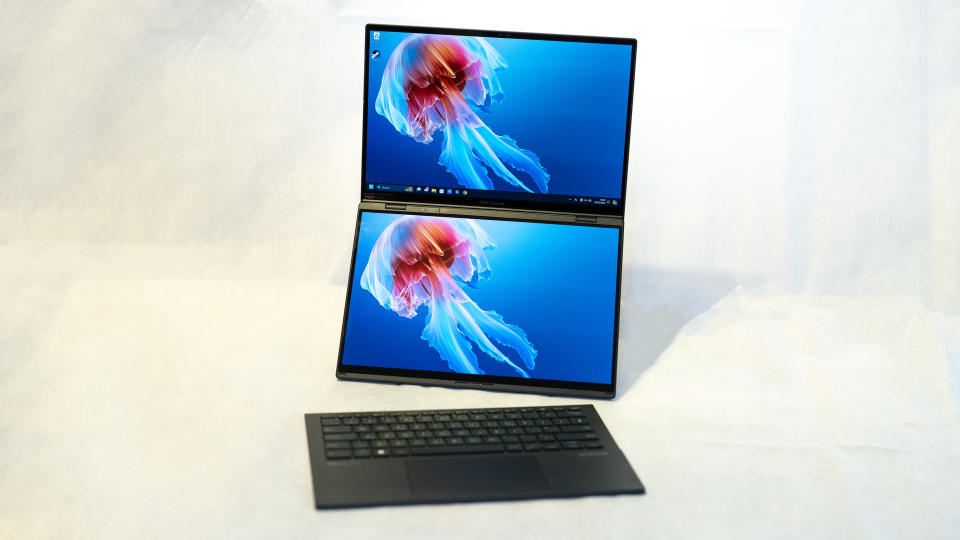
07. Asus Zenbook Duo OLED
The best 2-in-1 laptop for game development
CPU: Intel Core Ultra 9 185H | Graphics: Intel Arc Graphics | RAM: 32GB | Screen: 2x 14in 2880x1800 120Hz OLED | Storage: 2TB SSD
Two stunning screens
12 hours battery life in laptop mode
Exciting design
Comes with a stylus
Two screens drain battery
No stylus storage included
The Asus Zenbook Duo OLED is a great choice if you fancy using a 2-in-1 laptop, which can be used as a traditional laptop or as a tablet. While it doesn't feature a dedicated graphics card (which are very rare in 2-in-1 devices), it is packed with powerful components.
When used in tablet mode, you can test out how your game will work with touchscreen devices, while also making it more comfortable for reading reams of text, or for watching movies when you want to wind down. The Asus Zenbook Duo OLED has two OLED touchscreens
We looked for the compromises, but couldn't find any, so gave this 5/5 stars in our Asus Zenbook Duo OLED review.
8. Also tested
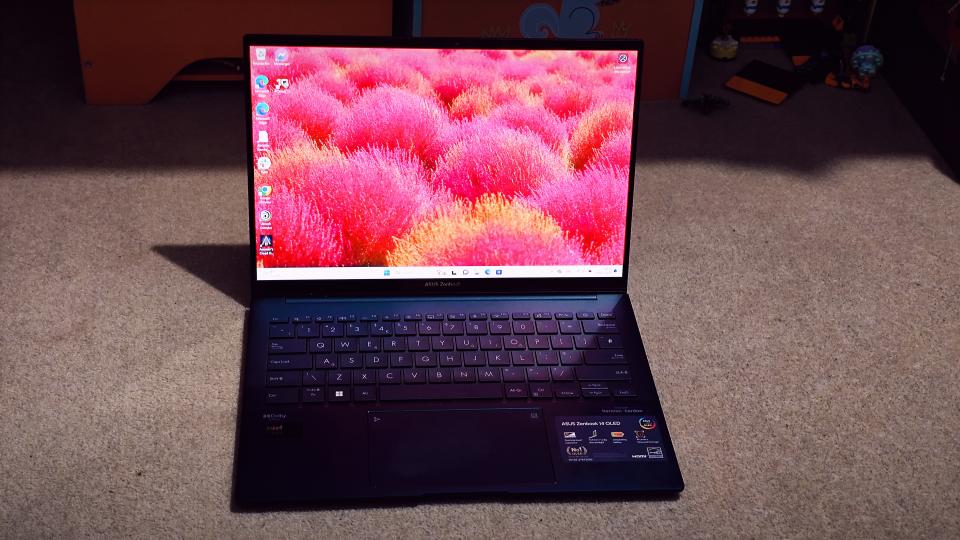
08. Asus Zenbook 14 OLED
A lightweight laptop with a gorgeous screen
CPU: Intel Core Ultra i9-185H Processor | Graphics: Intel Arc Graphics | RAM: 32GB | Screen: 14-inch, 3K (2880 x 1800) | Storage: 1TB SSD
Decent performance
Lightweight feel
Bright OLED touchscreen
Lack of ports
How to choose the best laptop for game development
Depending on what kind of game you’re developing, choosing the best laptop for game development can vary from person to person. If you’re working on a power-hungry and demanding 3D game, laptops with older processors won’t get the job done – you’ll need something newer and with a dedicated graphics card to ensure you can run and properly test your game.
Otherwise, you might be able to get away with a less powerful machine for something like an indie game and focus your attention on other qualities that suit your lifestyle and workflow, like battery life and portability.
It’s also worth considering if you actually need to play or test the game on your laptop of choice. If your main focus is programming, then you might only need something as lightweight and simple as a Chromebook, which is exactly why we've included one in our list of the best laptops for game development above. If you do want to test your games in all their glory, you'll want something with more processing power, a gorgeous screen and a speedy refresh rate. For more options, see our pick of the best student laptops and the best laptops for writers.
FAQs
How much RAM do I need for game development?
The more the better when it comes to RAM. You might get away with 32GB, but 64GB will comfortably see you through your game’s development – it’s also the recommended RAM for the popular Unreal Engine 5 game engine.
Are MacBooks good for game development?
Yes and no. The M1 shook up the computing world’s perception of MacBooks, and those ripples are also being felt in the gaming market. Now, MacBooks are a viable option in terms of performance, however, the software support is still a little weak. Add to that the fact that much of the PC gaming market exists within the pro-Windows Steam ecosystem and you may find yourself jumping through one too many hoops when using a MacBook for game development. That's not to say that the new M3 MacBooks don't have plenty of power though, we've put the MacBook Pro M3 13-inch as our best MacBook for game development, so it depends which operating system you prefer to work with. If you're used to a Mac then you may not want to switch to a Windows or Chromebook machine. See our guide to the best MacBook for programming for more options.
Is it better to use laptops or PCs for game development?
Overall, PCs are far superior to laptops when it comes to developing games. However, there are some significant benefits to using a laptop.
Naturally, they are portable, which is great for student developers, or those working remotely regularly. If you need to be on the move often and don’t have the money to invest in a PC as well as a laptop, choosing the latter might make more sense.
Especially if you already have a rig set up, having a laptop for game development means you can make tweaks and adjustments more easily. If you’re developing Triple-A games, you may struggle to render and test your game, but less demanding titles will generally be fine on a laptop.
How we tested the best laptops for game development
Creative Bloq's team of hardware experts bring with them many years of experience using, testing and benchmarking laptops with a focus on running creative applications. All the laptops in this guide have been tested either by using software used by game developers or benchmarked to ensure the CPU and GPU are capable of the most intensive game-dev tasks you can think of. We run different benchmark tests on each device depending on its intended use by its maker, but the laptops we've included in this guide have all been run through the following:
• Cinebench R23/2024 - this assesses the performance of a computer's CPU and GPU using real-world 3D rendering tasks
• Geekbench 5/6 - this tests the CPU's processing power, both by using a single core for a single task at a time as well as all the CPU's core to see its ability to multitask
• Handbrake - we use this free and open-source transcoder for digital video files to render a short 4K animated film, using the same file for all our tests
• 3DMark - this assesses a computer's ability to run graphic rendering tasks, which is necessary for architects
• PCMark 10 - this test assesses a computer’s ability to run all everyday tasks from web browsing to digital content creation, testing app launch speeds, 3D rendering and even battery life
But perhaps more importantly than technical benchmarking, we evaluate machines in real-world situations, pushing them to the limit with multiple applications running to see how they perform in real project-like conditions. Power, speed, flexibility, and what a computer looks and feels like to use are all criteria in our reviewing process.
We do much more than simply unpack a test unit, run some benchmarks and then pack it up again; we have lived and worked with all of the above computers, running them in real-life scenarios and completed projects relevant to the subject of this guide, otherwise we wouldn't recommend these models to you. For more details, see our article on How we test.
For more options, see our pick of the best laptops for CAD, the best laptops for architects and the best laptops for photo editing.

